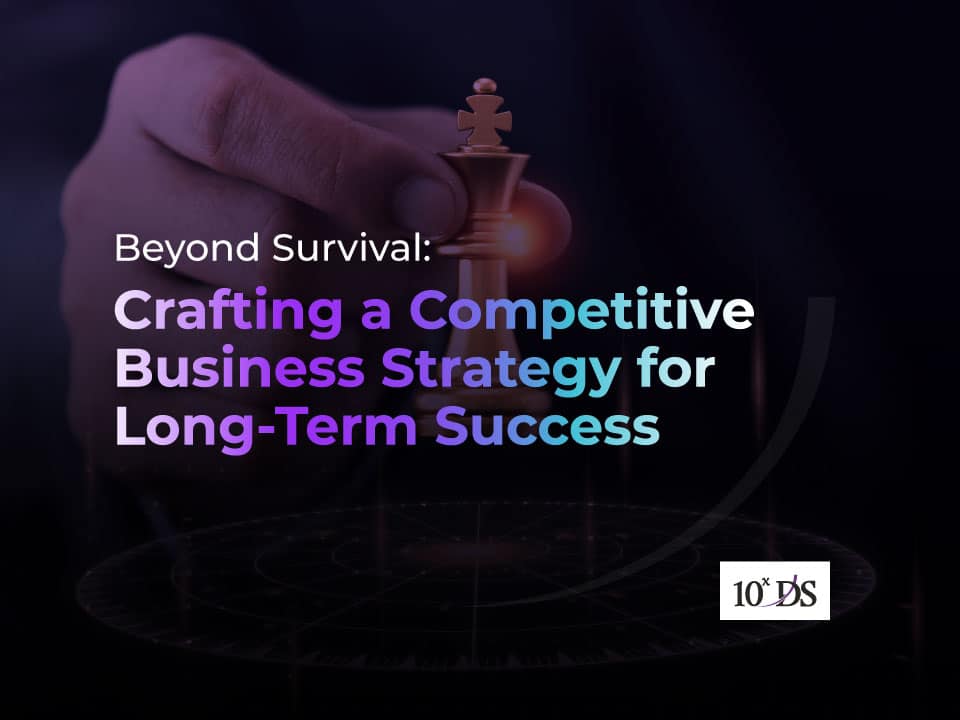
Beyond Survival: Crafting a Competitive Business Strategy for Long-Term Success
Oxford Dictionary defines strategy as “a plan that is intended to achieve a particular purpose”. A competitive strategy helps businesses achieve its objectives and outperform its competitors. In today’s rapidly changing business landscape, it’s more important than ever for companies to have a competitive strategy that can future proof their business. With new technologies, emerging markets, and changing customer expectations, businesses need to be able to adapt quickly to stay ahead of the competition. The strategies vary from industry to industry and depend on the nature of the business. A retailer will need to definitely need to have a strategy to differentiate themselves from competitors by offering a unique product mix that sets them apart along with other aspects such as pricing, customer service etc. Similarly, providing quality patient care is the primary strategy of healthcare businesses along with others. Some examples of strategies that worked well for companies are:
- Apple through its ‘differentiation strategy’, successfully developed a strong brand identity through sleek design, innovative technology, and a focus on user experience.
- Tesla is an example of a company that has ‘focus strategy’ in the automotive industry by introducing electric vehicles and self-driving technology.
- Amazon has an ‘innovation strategy’ that has allowed them to disrupt multiple industries, from retail to cloud computing.
- Walmart has a ‘cost leadership strategy’, which allows them to offer low prices and attract price-sensitive customers.
- Zappos built a loyal customer base by offering free shipping and returns, a 365-day return policy, and 24/7 customer service and is an example of ‘customer service strategy’.
A well-designed competitive business strategy takes several components into consideration and is tailored to the unique needs and goals of the company. By developing a strong competitive business strategy, companies can position themselves for success in the marketplace and achieve long-term growth and profitability.
Mission statement: A clear and concise statement of the company’s mission and vision, outlining its goals and objectives.
SWOT analysis: An analysis of the company’s strengths, weaknesses, opportunities, and threats. This helps to identify areas where the company can capitalize on its strengths and address any potential weaknesses.
Competitive analysis: An analysis of the company’s competitors, their strengths and weaknesses, and their strategies. This helps to identify opportunities for the company to differentiate itself and gain a competitive advantage.
Value proposition: A statement that articulates the unique value that the company offers to its customers, and how it differs from its competitors.
Target market: A clear understanding of the company’s target market, including demographic, psychographic, and behavioural characteristics.
Marketing strategy: A plan for how the company will market its products or services to its target market, including branding, messaging, and advertising.
Operational strategy: A plan for how the company will manage its operations to maximize efficiency and minimize costs.
Financial strategy: A plan for how the company will manage its finances to maximize profitability and ensure long-term sustainability.
Let us also explore some key strategies for building a competitive business that can thrive in the future.
1. Embrace new technologies
The pace of technological change is accelerating, and businesses that fail to keep up risk being left behind. To future proof your business, it’s essential to stay on top of new technologies and embrace them where appropriate. This could mean investing in new software tools or hardware infrastructure, adopting cloud computing solutions, or leveraging data analytics to gain insights into customer behavior and market trends. By staying ahead of the curve when it comes to technology, your business can remain competitive and agile in the face of change.
2. Focus on customer experience
One thing that will never change in business is the importance of delivering a great customer experience. As customer expectations continue to evolve, businesses that can deliver personalized, seamless experiences across all channels will have a distinct advantage. To future proof your business, it’s important to invest in technologies that can help you deliver exceptional customer experiences, such as chatbots, mobile apps, and social media platforms. By putting the customer at the center of your business strategy, you’ll be able to stay ahead of the competition and adapt to changing market conditions.
3. Build a culture of innovation
Innovation is key to future proofing your business, and it starts with building a culture that values creativity and experimentation. Encourage your employees to take risks, test new ideas, and think outside the box when it comes to problem-solving. By fostering a culture of innovation, you’ll be able to stay ahead of the competition by constantly exploring new ideas and opportunities. This could mean developing new products or services, exploring new markets, or finding new ways to streamline your operations.
4. Keep an eye on emerging markets
As the global economy continues to shift, emerging markets are becoming increasingly important. To future proof your business, it’s essential to keep an eye on these markets and explore opportunities for growth. This could mean investing in new manufacturing facilities in emerging markets, partnering with local businesses to expand your reach, or developing new products or services specifically tailored to these markets. By staying ahead of the curve when it comes to emerging markets, your business can tap into new sources of growth and stay competitive for years to come.
5. Build a flexible organizational structure
Finally, to future proof your business, it’s important to build a flexible organizational structure that can adapt to changing market conditions. This could mean investing in agile project management methodologies or reorganizing your teams to be more cross-functional and adaptable. By building a flexible organizational structure, you’ll be able to respond quickly to changing market conditions and ‘take advantage of new opportunities as they arise.
In conclusion, building a competitive strategy that future proofs your business is essential in today’s rapidly changing business landscape. Staying up to date with industry trends and being willing to adapt to change is also key in updating your strategy for the changing times. By taking the time to develop a comprehensive strategy that includes all of the key components, companies can position themselves for success in the marketplace and achieve long-term growth and profitability.
Talk to our experts to know more.


